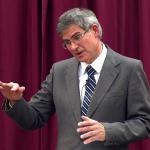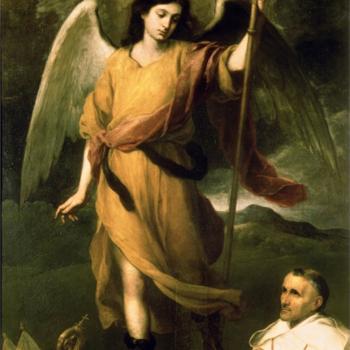
(11-30-07)
***
[my blue highlighting throughout]
***
Martin Luther’s successor Philip Melanchthon (1497-1560) was (contrary to widespread Protestant antipathy to hierarchical Church government) willing to revive the jurisdiction of Catholic bishops in negotiations at the Diet of Augsburg in 1530. This is documented by many historians. For example, note his letter to Cardinal Campeggio, of 4 August, 1530:
For this reason I have often shown that if a few things were kept in the background, these divisions could be healed. In my opinion it would contribute very much to the quiet of the Church and to the dignity of the Roman See, to make peace on the conditions which I have mentioned. For also our priests should in turn render obedience to the bishops. Thus the Church would unite again in one body, and the Roman See would have its own honour, so that, if anything wrong remains in the churches, it can gradually be corrected by the care of the bishops. It is also our earnest desire to be freed from these contentions, that we may give our whole attention to the diligent improvement of doctrine. And unless this be done, wise men can easily foresee what, amid so many sects, will come upon posterity. And in this matter it is easy to see how indifferent those are whom you now oppose to us. Yesterday the Confutation of our Confession was read. If it shall be published, condemning us, believe me it will not have great admiration among judicious men, and will irritate the minds of ours. Thus there is danger that by the renewal of this whole tragedy, greater commotion than ever will ensue. Hence I desire that these evils of the Church be not increased in virulence. Therefore I beg you to indicate to me in a few words, whether you have spoken with your Reverend Master about those conditions, and what hope he will hold out. If I can obtain anything favourable I will take care that the Roman See may not repent its kindness. The feelings and desires of many good men are united in this matter, who will do all they can to enlarge the authority of the bishops and to establish the peace of the Church. (Philip Melanchthon: The Protestant Preceptor of Germany, James William Richard [Lutheran], New York: G. P. Putnam’s Sons, 1898, 213 [online link] )
Biographer Richard continues:
He is willing that the government of the Pope, and of the bishops, shall remain for the sake of unity throughout the world, provided they do not abuse their authority by suppressing sound doctrine. (Ibid., 221-222)
These Articles, because they were laid before the convention at Schmalkald in February, 1537, are known as the Schmalkald Articles. They are the most positive and antipapal of all the Lutheran Confessions, and are in effect a declaration of war against Rome. Melanchthon, influenced by his love of peace, and by his preference for a Church government independent of the State, subscribed with the following qualifications:
“I, Philip Melanchthon, regard the foregoing articles as right and Christian. But of the Pope I hold that if he will permit the Gospel, the government of the bishops which he now has from others, may be jure humano also conceded to him by us, for the sake of peace and the common tranquillity of those Christians who are, or may hereafter be under him.” (Ibid., 261)
Melanchthon also expressed the same thing (lest we think his “offer” was only in the context of conciliation and diplomacy) to his very close — perhaps best — friend, Joachim Camerarius, in a letter of August 31, 1530:
Oh, would that I could, not indeed fortify the domination, but restore the administration of the bishops. For I see what manner of church we shall have when the ecclesiastical body has been disorganized. I see that afterwards there will arise a much more intolerable tyranny [of the princes] than there ever was before. (in Book of Concord, “Historical Introductions to the Lutheran Confessions,” by F. Bente: VII. Smalcald Articles and Tract concerning Power and Primacy of the Pope: section 70)
Historian Philip Schaff mentioned this belief of Melanchthon’s, on p. 33 of his History of the Christian Church, Vol. VII (Chapter One; § 10):
The transfer of the episcopal and papal power to the head of the state was not contemplated by the Reformers, but was the inevitable consequence of the determined opposition of the whole Roman hierarchy to the Reformation. The many and crying abuses which followed this change in the hands of selfish and rapacious princes, were deeply deplored by Melanchthon, who would have consented to the restoration of the episcopal hierarchy on condition of the freedom of gospel preaching and gospel teaching.
. . . The controversies among the Protestants in the sixteenth century roused all the religious and political passions and cast a gloom over the bright picture of the Reformation. Melanchthon declared that with tears as abundant as the waters of the river Elbe he could not express his grief over the distractions of Christendom and the “fury of theologians.”
Also, in the same volume, Chapter Five, § 76:
The Protestant sovereigns became supreme bishops in their respective dominions. They did not preach, nor administer the sacraments, but assumed the episcopal jurisdiction in the government of the Church, and exercised also the right of reforming the Church (jus reformationis) in their dominions, whereby they established a particular confession as the state religion, and excluded others, or reduced them to the condition of mere toleration. This right they claimed by virtue of a resolution of the Diet of Speier, in 1526, which was confirmed by the Peace of Augsburg, 1555, and ultimately by the Peace of Westphalia, 1648. The Reformers regarded this secular summepiscopate as a temporary arrangement which was forced upon them by the hostility of the bishops who adhered to the Pope. They justified it by the example of Josiah and other pious kings of Israel, who destroyed idolatry and restored the pure worship of Jehovah. They accepted the protection and support of the princes at the sacrifice of the freedom and independence of the church, which became an humble servant of the state. Melanchthon regretted this condition; and in view of the rapacity of the princes, and the confusion of things, he wished the old bishops back again, and was willing even to submit to the authority of a pope if the pope would allow the freedom of the gospel. In Scandinavia and England the episcopal hierarchy was retained, or a new one substituted for the old, and gave the church more power and influence in the government.
Again, in his Vol. VIII, Chapter 18, § 164, Schaff refers to Melanchthon’s lament over divisions:
Melanchthon left this world at his own home (1560), like Calvin; his last and greatest sorrow was the dissensions in the Church for which he could shed tears as copious as the waters of the Elbe. He desired to die that he might be delivered first of all from sin, and also from “the fury of theologians.”
Both Melanchthon and Luther were intensely disturbed and disgusted by divisions in Protestantism (though they never seemed to concede that the Protestant — Lutheran — first principles of private judgment and sola Scriptura played a key role in the ensuing divisions). In a letter to Thomas Cranmer on May 1st, 1548, Melanchthon states:
. . . I hope, and desire to urge, that you will put forth a true and perspicuous Confession on the whole body of doctrine, the judgments of learned men having been compared, and their names being subscribed to it; in order that an illustrious testimony of doctrine, delivered with grave authority, may be extant among all nations, and that posterity may have a rule to follow. . . .
Far better it is, in the Church, to call a spade, a spade, than to throw ambiguous expressions before posterity; as in mythology it is said that the apple of strife was thrown before the Goddesses seated at a banquet. If there had been a clear consent among our Churches in Germany, we should not have fallen into these miseries. (Gleanings of a Few Scattered Ears During the Period of the Reformation in England, George Cornelius Gorham [Anglican], London, 1857 [online link], 44-46; quote from p. 45)
John Calvin wrote a similar letter to John Knox (dated 23 April 1561):
It grieves me exceedingly, that your noble men are torn asunder by intestine dissensions. It is not unreasonable that you should be more vexed and distressed by the internal workings of Satan, than you have hitherto been by the attacks of the French. (Ibid., p. 418)
Protestant historian Philip Schaff, in his biographical study of Melanchthon, cites another very similar sentiment (unfortunately undocumented) — the “as many tears as the river Elbe” motif –, from Melanchthon’s “last days”:
Add to these public calamities and personal attacks the growing weakness and sickness of the body, and various domestic bereavements, and we need not wonder that the last years of Melanchthon were years of grief and sorrow rather than of joy and pleasure. He experienced the full measure of that melancholy which cast its shade over the closing scenes of Luther, and many other great and good men. He often prayed to be delivered from the “fury of theologians” (rabies theoloyorum).
His personal sufferings, however, did not affect him near as much as his care for the Church. He uttered the noble sentiment: “If my eyes were a fountain of tears, as rich as the river Elbe, I could not sufficiently express my sorrow over the divisions and distractions of Christians.” His heart and soul longed and prayed, in unison with the spirit of his divine Master, that all believers “may be perfected into one,” even as He and the Father are one (John xvii. 23). (Saint Augustin, Melanchthon, Neander: Three Biographies, New York: Funk & Wagnalls, 1886, 121 [online link] )
Presumably, this statement, dating from our subject’s last days, must be dated around 1559-1560, which means that it is distinct from the utterance to Cranmer in 1548. This, in turn, means that it was a more or less general ongoing opinion of Melanchthon’s, concerning Protestant division, as opposed to a momentary despairing.
Thus, Melanchthon, Luther, and Calvin were all quite distressed about the increasing sectarianism of their time, whereas many Protestants today think it is a big non-issue that there are many sects, as long as they agree on so-called “central doctrines.” That has become a necessary development, in light of the inability of historic Protestantism to bring about doctrinal and ecclesial unity, except in cases of denominations becoming so liberal that they can unite with others similarly “heterodox” (from a denominational perspective).
***
Photo credit: Portrait of Philipp Melanchthon (1543), by Lucas Cranach the Elder (1472-1553) [public domain / Wikimedia Commons]
***













